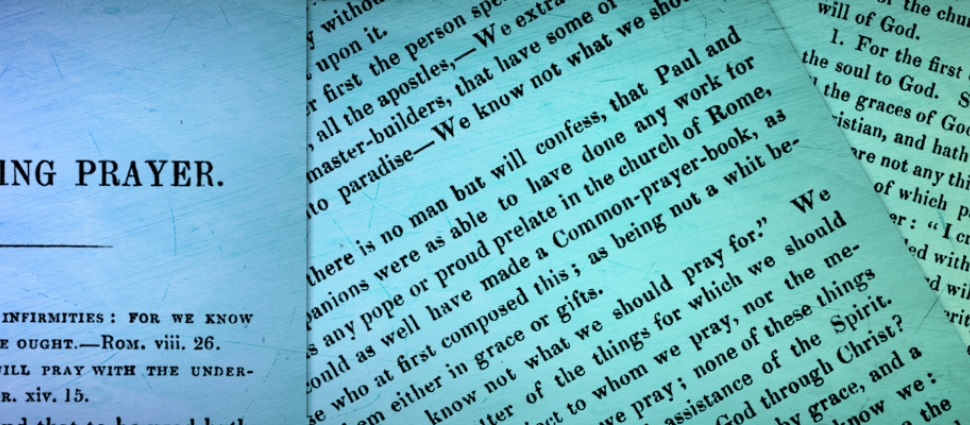John Bunyan on Prayer (2)

Amy Mantravadi joins us this week to discuss John Bunyan's A Discourse Touching Prayer. Read her second post below:
“There is no man nor church in the world that can come to God in prayer, but by the assistance of the Holy Spirit."
“Prayer, without the heart be in it, is like a sound without life; and a heart, without it be lifted up of the Spirit, will never pray to God.”
These two quotes are very typical of Bunyan’s argument in A Discourse Touching Prayer. Working off of Paul’s declaration that “I will pray with the spirit, and I will pray with the understanding also” (1 Corinthians 14:15 KJV), Bunyan emphasized the need for the Spirit in all aspects of a Christian’s prayer life, beginning with our initial union with Christ. “And because this poor creature is thus a member of the Lord Jesus, and under this consideration hath admittance to come to God; therefore, by virtue of this union also, is the Holy Spirit conveyed into him, whereby he is able to pour out himself, to wit, his soul, before God, with his audience.”
The first way in which the Spirit assists us in prayer, according to Bunyan, is by revealing to us the truth of God’s Word.
“And indeed the Holy Ghost doth not immediately quicken and stir up the heart of the Christian without, but by, with, and through the Word, by bringing that to the heart, and by opening of that, whereby the man is provoked to go to the Lord, and to tell him how it is with him, and also to argue, and supplicate, according to the Word…”
The second benefit we receive from the Spirit is closely connected. By the working of the Spirit in our hearts, the will of God is illuminated for us in His Word, and it is only according to this will that we ought to pray. “For, as I said before, that petition that is not put up in and through the Spirit, it is not to be answered, because it is beside the will of God. For the Spirit only knoweth that, and so consequently knoweth how to pray according to that will of God.” He goes on to add,
“For in that which is according to his will only, he heareth us, and in nothing else. And it is the Spirit only that can teach us so to ask; it only being able to search out all things, even the deep things of God. Without which Spirit, though we had a thousand Common Prayer Books, yet we know not what we should pray for as we ought, being accompanied with those infirmities that make us absolutely incapable of such a work.”
It should be noted here that Bunyan did not believe the will of God was something nebulous or mystical. He linked this concept with the study of God’s Word and the true knowledge that we receive from the Scriptures.
One area where we need knowledge, according to Bunyan, is in our comprehension of our own sinful state. “Nothing but the Spirit can show a man clearly his misery by nature, and so put a man into a posture of prayer,” he wrote. “No, here is the life of prayer, when in or with the Spirit, a man being made sensible of sin, and how to come to the Lord for mercy; he comes, I say, in the strength of the Spirit, and crieth Father.” Bunyan concluded, “That one word spoken in faith, is better than a thousand prayers, as men call them, written and read, in a formal, cold, lukewarm way.”
Bunyan also saw our communion with God’s Spirit as the primary way in which we banish our doubts related to prayer. He acknowledged the difficulty of maintaining an active and genuine prayer life and pointed to the Spirit as our source of power and comfort.
“The nearer a man comes in any work that God commands him to the doing of it according to his will, so much the more hard and difficult it is; and the reason is, because man, as man, is not able to do it. But prayer, as aforesaid, is not only a duty, but one of the most eminent duties, and therefore so much the more difficult: therefore Paul knew what he said, when he said, ‘I will pray with the Spirit.’ He knew well it was not what others write or said that could make him a praying person; nothing less than the Spirit could do it.”
Bunyan’s emphasis on the work of the Spirit is particularly notable throughout his writings on prayer. It demonstrates that despite their focus on doctrinal particulars and the corporate aspects of worship, the Puritans by no means dismissed the importance of an individual’s private prayer life. The key was in setting down a biblical foundation, allowing the Spirit to illumine us, and proceeding from there to pray according to the will of God. The communion with God described by Bunyan was so much richer than what many of today’s preachers have to offer. We can benefit from reading his writings.
Meet the Puritans is a conversation of the Alliance of Confessing Evangelicals. It is supported only by its readers and gracious Christians like you. Please prayerfully consider supporting us.
This book is available from Puritan Paperbacks under the title Prayer. As it is in the public domain, it is also freely available in digital form.
For previous posts in this series, see:





